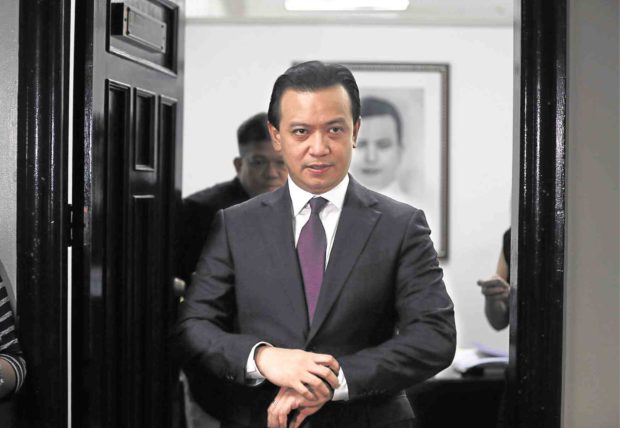A military officer has issued an affidavit essentially supporting the assertion of Sen. Antonio Trillanes IV that he, as a military rebel, filed an amnesty application in January 2011 that included a general admission of guilt.
Trillanes on Monday submitted the affidavit of Col. Josefa Berbigal, an officer at the Judge Advocate General’s office, to Makati Regional Trial Court (RTC) Branches 148 and 150, which were hearing the motions of the Department of Justice (DOJ) to have him arrested for rebellion and coup d’état.
Berbigal headed the secretariat of the temporary amnesty committee of the Department of National Defense (DND) that processed the applications in accordance with Proclamation No. 75 issued in 2010 by then President Benigno Aquino III granting amnesty to military officers and servicemen who took part in the 2003, 2006 and 2007 attempts to overthrow then President Gloria Macapagal-Arroyo.
Trillanes also submitted the affidavit of former Defense Undersecretary Honorio Azcueta stating that Trillanes’ amnesty application was among those recommended for approval by the committee, and which underwent the necessary procedures.
No amnesty application?
The DOJ’s move to have Trillanes arrested stemmed from President Rodrigo Duterte’s voiding of Trillanes’ amnesty on the ground that he did not file an official application form nor admitted his guilt.
The President’s Proclamation No. 572 was anchored on a certification from the defense department that there was “no available copy of [Trillanes’] application for amnesty in the records.”
But Trillanes said Berbigal’s affidavit showed gaping holes in the President’s proclamation voiding his amnesty.
“All the holes are not in our camp, but are with [Solicitor General Jose] Calida and Duterte, who have arguments full of holes,” he told reporters at the Senate on Monday.
In her affidavit, Berbigal said she personally handled Trillanes’ application for amnesty.
“I know that Senator Trillanes filed his amnesty application because I was the one who personally received Senator Trillanes’ amnesty application on Jan. 5, 2011,” she said.
Official form
Berbigal said the application was filed “using the official form provided by the DND ad hoc amnesty committee.”
She said that before she received Trillanes’ application form, she asked him to read the preprinted statement in the form “making a general admission of his guilt for his alleged offenses” before asking him to take his oath.
The committee later found Trillanes’ application “to be in order, complete and in compliance with all of the requirements of Proclamation No. 75, Series of 2010, as well as its implementing rules,” she said.
The committee recommended the approval of Trillanes’ application, she said.
Trillanes on Monday also disputed claims that President Aquino could not delegate the grant of amnesty, and that his amnesty certificate should have been signed by the President.
He pointed out that the grant of amnesty was contained in Proclamation No. 75 signed by Aquino.
The amnesty certificate given to the soldiers need not be signed by the President himself as this was not a constitutional requirement, he said.
1987, 1989 coup attempts
He showed a copy of an amnesty certificate issued in 2001 for the 1987 and 1989 coup attempts. The certificate was not signed by the President, but by members of the national amnesty commission.
It’s “common sense” that the President need to sign only the proclamation, while the certificates would be signed by to whoever he delegated the task, he said.
He said Proclamation 75 only required a general admission of guilt.
Trillanes also presented photos showing that he had his Supreme Court petition challenging the voiding of his amnesty notarized before filing it.
This was in response to Calida’s assertions that the petition was not notarized.
Calida has asked the Supreme Court to dismiss Trillanes’ challenge to Proclamation No. 572, claiming the former military mutineer made a “misrepresentation” regarding his amnesty in order to secure the dismissal of the coup d’état and rebellion charges against him.
Cases dismissed
Trillanes argued that he could no longer be arrested and the charges could not be revived because Makati RTC Branches 148 and 150 dismissed the charges in September 2011, extinguishing his liability.
In its Supreme Court filing, however, the Office of the Solicitor General (OSG) said the dismissal orders “may be characterized as void” and Trillanes should be put on trial again in “the pursuit of a policy of rectification.”
The OSG insisted that Trillanes failed to file an application for amnesty and admit his guilt, pointing out that the senator did not attach a copy of the document when he filed his Supreme Court petition on Sept. 6.
It also cited the admission of Trillanes’ lawyer Reynaldo Robles, who told Makati RTC Branch 150 during a hearing on Sept. 13 that the senator had no copy of his application form.
The OSG argued that Section 19, Article VII of the 1987 Constitution required congressional concurrence only for the grant of amnesty, not for its revocation.
It said Aquino’s delegation of his “authority to grant clemency” violated Section 19, Article VII of the Constitution, noting that executive clemency or pardon pertains to convicts, which Trillanes was not since his cases were dismissed due to the amnesty.
The OSG argued that although Aquino granted “general amnesty” to mutinous soldiers through Proclamation No. 75 in 2010, the “actual and specific amnesty” to Trillanes “only came on Jan. 21, 2011” after it was granted by the DND amnesty committee.
